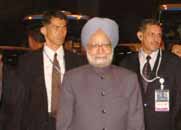|
Toyako, Japan: Leaders of the world's leading industrialized nations met leaders of African countries for more than three hours today and failed to agree on how to bring political stability to Zimbabwe after a 'sham' election that has received widespread condemnation around the world.  "I want to assure you that the concerns you have expressed are, indeed, the concerns of many of us on the African continent," said president Jakaya Kikwete of Tanzania, also head of the African Union, to President George W Bush of the United States as the two leaders addressed a press conference after the lengthy meet. "The only area that we may differ on is the way forward," he added. "I want to assure you that the concerns you have expressed are, indeed, the concerns of many of us on the African continent," said president Jakaya Kikwete of Tanzania, also head of the African Union, to President George W Bush of the United States as the two leaders addressed a press conference after the lengthy meet. "The only area that we may differ on is the way forward," he added.
Neither president's Bush or Kikwete mentioned details about a sanctions plan, which could likely come up before the United Nations this week. President Kikwete may have been more interested in the initiatives that members of the G8 nations would have in mind regarding promises made to nations of the African continent at a G8 meet two years ago. G8 leaders had then vowed to double financial assistance to Africa to $22 billion by 2010. Reports from NGOs now suggest that barely 14 per cent of those funds may have been delivered. "We need people who not only make promises, but write checks for the sake of human rights and human dignity and for the sake of peace. Accountability is really important when it comes to our work on the continent of Africa," President Bush said. Accountability would certainly do the US no harm as data would reveal that it tops the list of donors to Africa and that it may have met its commitments a bit more dutifully than others. Pres Bush said he would use this year's G8 summit to press other leaders to honour previous commitments to help Africa. On the issue of global climate change, though, president Bush may himself need to be shepherded into falling in line with mainstream thinking on the issue. The task to herd a recalcitrant US president back into the mainstream may well befall the Japanese premier,Yasuo Fukuda. Analysts foresee the Japanese premier trying to bring Bush on board a global initiative that will try and set ambitious emission reduction targets and yet try and keep the US on board, at least in a manner that ensures that a new US administration after Bush can be part of the initiative and eventually steer it in a direction that it is comfortable with. At last year's G8 meeting in Germany, Bush blocked binding limits on greenhouse gases as they did not apply to other big polluting nations, including China and India. At the fag end of his second and final term, all participants will take care to remember that president Bush had also begun his first term as president by wrecking the Kyoto Protocol. It was his contention then that the Kyoto Protocol would have ''wrecked'' the US economy. This year's summit will include China and India in a separate meeting of 16 major economies responsible for 80 per cent of world carbon-dioxide emissions, and so discussions can be held across the board and a broader sense of commitments can be sought from participating nations. Prime minister Fukuda has said he wants a 50 per cent reduction in greenhouse gases by 2050. The White House has applauded his intentions but said that each nation needs to set its own mid-term targets. BRIC constituents China, India and Brazil are invited for the meet and so are South Africa and Mexico. Also invited to the summit are South Korea, Indonesia and Australia. Russia is already a part of the G8 grouping. Given the meet's focus on African issues a number of countries from the continent such as those of Ethiopia, Ghana, Nigeria, Senegal, and Tanzania are expected to attend.  Indian prime minister, Manmohan Singh, battling increasing pressure from allies at home will arrive at the summit with some reasons to smile having successfully staved off a direct threat to his government with other political parties stepping in to provide his government a safety in numbers in the parliament. Indian prime minister, Manmohan Singh, battling increasing pressure from allies at home will arrive at the summit with some reasons to smile having successfully staved off a direct threat to his government with other political parties stepping in to provide his government a safety in numbers in the parliament.
He will be warmly welcomed by president Bush, whose major policy initiative, the Indo-US nuclear deal may now lurch forward towards fruition. While other nations would be eyeing president Bush's stance on the issue of global warming he himself would very likely be taking stock of the next moves that the diminutive Indian prime minister and his own administration are likely to take to advance te nuclear deal forward. At a personal level, the Indo-US nuclear deal offers the US president the only chance of showcasing a foreign initiative that has came good in a two-term administration that has had a very contentious track record. It is also a deal that has attracted bi-partisan support from the US Congress and may be the president's only opportunity to draw some applause for achievements in foreign policy.
|